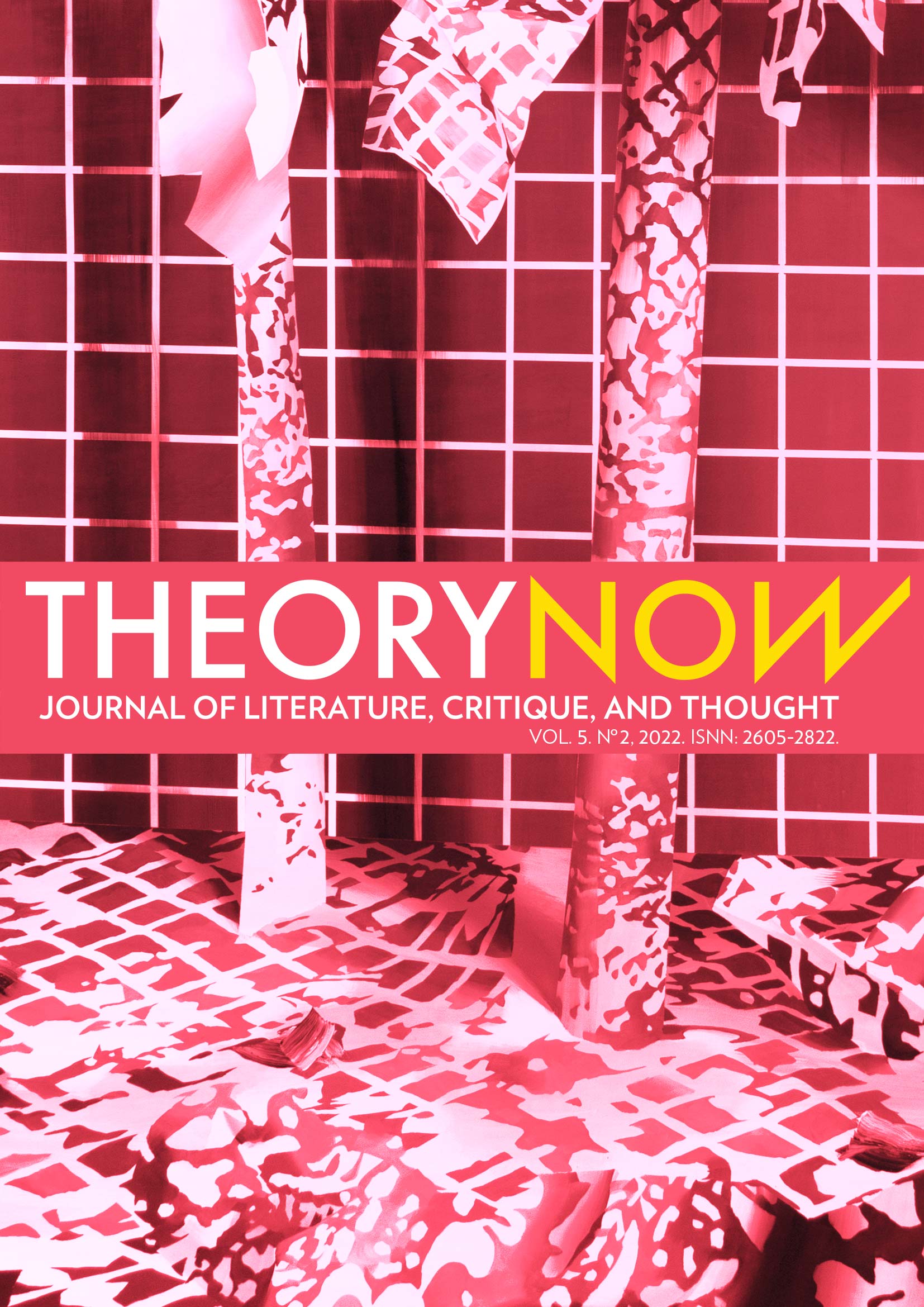Algunos aspectos sobre el uso del psicoanálisis freudiano por Terry Eagleton
DOI:
https://doi.org/10.30827/tn.v5i2.24463Palabras clave:
Terry Eagleton, Sigmund Freud, Karl Marx, Psicoanálisis, amor, razónResumen
El presente artículo examina el uso que Terry Eagleton hace del psicoanálisis freudiano. Comenzamos analizando el interés creciente de Eagleton en el psicoanálisis a finales de la década de 1970, particularmente en “Marx, Freud and Morality” (1977). Desplazamos a continuación nuestra atención a tres temas fundamentales en relación con los cuales Eagleton recurre al psicoanálisis: el trabajo, el amor y la razón. En cada uno de estos tres casos presentamos las maneras en las que Eagleton postula al psicoanálisis como un posible complemento al marxismo, incluso cuando esta compatibilidad no es inmediatamente evidente. Nuestra lectura pretende ser descriptiva, pero no deja de señalar las inconsistencias que hemos encontrado en el uso y la valoración que del psicoanálisis hace Eagleton. En el caso del trabajo, invocamos la relevancia de la visión que Freud tiene del trabajo como inherentemente desagradable en conexión con el concepto marxiano de trabajo alienado. En cuanto al amor, presentamos el modo en que Eagleton se centra en el amor agape más que en la concepción freudiana del amor como eros. Por lo que respecta a la razón, nos centramos en la fe de Freud en el intelecto y la ciencia como únicas salvaguardas de la humanidad contra los asedios del superego.
Descargas
Citas
Alderson, David. Terry Eagleton. Basingstoke: Palgrave Macmillan, 2004.
Dolar, Mladen. A Voice and Nothing More. Cambridge, MA, The MIT Press, 2006.
Eagleton, Terry. “Marx, Freud and Morality”. New Blackfriars, vol. 50, no. 680, 1977, pp. 21-29.
____. The Rape of Clarissa: Writing, Sexuality and Class Struggle in Samuel Richardson. Minneapolis, MN, University of Minnesota Press, 1982.
____. Literary Theory: An Introduction. Minneapolis, MN, University of Minnesota Press, 1983.
____. “Introduction”. Ideology, Terry Eagleton (ed.), London, Longman, 1994, pp. 1-20.
____. The Ideology of the Aesthetic. 1990. Oxford, Blackwell, 1992.
____. Heathcliff and the Great Hunger. London, Verso, 1995.
____. Sweet Violence: The Idea of the Tragic. Oxford, Blackwell, 2003.
____. “Introduction to the Second Edition (1987)”. Myths of Power: A Marxist Study of the Brontës. 1975. Basingstoke, Palgrave Macmillan, 2004, pp. xxi-xxix.
____. Holy Terror. Oxford: Oxford University Press, 2005.
____. Criticism and Ideology: A Study in Marxist Literary Theory. 1976. London, Verso, 2006.
____. The Meaning of Life: A Very Short Introduction. Oxford, Oxford University Press, 2007.
____. “El sentido de la vida”. La condició humana: Debat al CCCB, 4 February 2008, Centre de Cultura Contemporània de Barcelona, Barcelona, 2008.
____. The Trouble with Strangers: A Study of Ethics, Oxford, Wiley-Blackwell, 2009.
____. On Evil. New Haven, CT: Yale University Press, 2010.
____. Humour, New Haven, CT, Yale University Press, 2019.
Freud, Sigmund. “On Narcissism: An Introduction.” The Standard Edition of the Complete Psychological Works of Sigmund Freud, Vol XIV (1914-1916). Edited and translated by James Strachey. London, The Hogarth Press and the Institute of Psycho-Analysis, 1957, pp. 73-102.
____. The Future of an Illusion. The Standard Edition of the Complete Psychological Works of Sigmund Freud, Vol XXI (1927-1931). Edited and translated by James Strachey. London, The Hogarth Press and the Institute of Psycho-Analysis, 1961a, pp. 1-56.
____. Civilization and Its Discontents. The Standard Edition of the Complete Psychological Works of Sigmund Freud, Vol XXI (1927-1931). Edited and translated by James Strachey. London, The Hogarth Press and the Institute of Psycho-Analysis, 1961b, pp. 57-145.
____. “The Dissection of the Psychical Personality”. The Standard Edition of the Complete Psychological Works of Sigmund Freud, Vol XXII (1932-1936). Edited and translated by James Strachey. London, The Hogarth Press and the Institute of Psycho-Analysis, 1964a, pp. 57-80.
____. “The Question of a Weltanschauung”. The Standard Edition of the Complete Psychological Works of Sigmund Freud, Vol XXII (1932-1936). Edited and translated by James Strachey. London, The Hogarth Press and the Institute of Psycho-Analysis, 1964b, pp. 158-182.
Holy Bible, Grand Rapids, MI, The Zondervan Corporation, 1962.
Lacan, Jacques. The Seminar of Jacques Lacan, Book XI: The Four Fundamental Concepts of Psychanalysis, Jacques-Alain Miller (ed.). Translated by Alan Sheridan. New York, Norton, 1981.
____. The Seminar of Jacques Lacan, Book VII: The Ethics of Psychoanalysis, Jacques-Alain Miller (ed.). Translated by Denis Porter. New York, Norton, 1992.
____. “Kant with Sade.” Écrits. Bruce Fink (ed.), New York, Norton, 2006.
Lukács, Georg. History and Class Consciousness. London, Merlin Press, 1990.
Marx, Karl. Economic and Philosophic Manuscripts of 1844. New York, International Publishers, 1964.
Marx, Karl. Grundrisse. Foundations of the Critique of Political Economy. Harmondsworth, Penguin Books and New Left Books, 1973.
Marx, Karl and Friedrich Engels. The German Ideology. Amherst, NY, Prometheus, 1998.
Phillips, Adam. “Freud’s Helplessness.” The Joys of Secularism: 11 Essays for How We Live Now, George Levine (ed.), Princeton, NJ: Princeton University Press, 2011, pp. 115-133.
Smith, Paul. Discerning the Subject. Minneapolis, MN, University of Minnesota Press, 1988.
Žižek, Slavoj. The Indivisible Remainder: On Schelling and Related Matters, London, Verso, 1996.
Descargas
Publicado
Cómo citar
Número
Sección
Licencia
Theory Now Journal of Literature, Critique, and Thought es una publicación de acceso abierto e inmediato totalmente gratuita, tanto para lectorxs como para autorxs. Lxs autorxs no pagan ningún tipo de tasa por el proceso editorial de sus artículos. Permitimos la lectura, descarga, copia, distribución, impresión, búsqueda, enlace o reutilización con fines no comerciales de todos los trabajos publicados, siempre que se citen la autoría, la revista y el órgano editor. Todo material intelectual publicado en esta revista se encuentra protegido con una licencia de Creative Commons Reconocimiento-NoComercial .
Recomendamos encarecidamente la difusión de los artículos en redes sociales (Facebook, Twitter, LinkedIn, etc.) y científicas (ResearchGate, Academia.edu, etc.), repositorios institucionales universitarios y otros repositorios públicos, blogs y webs personales o institucionales, Google Scholar, ORCID, ResearchID, ScopusID, etc. En cualquier caso, la propiedad intelectual de los artículos y los posibles derechos económicos derivados de ellos son exclusivamente de sus autores.













